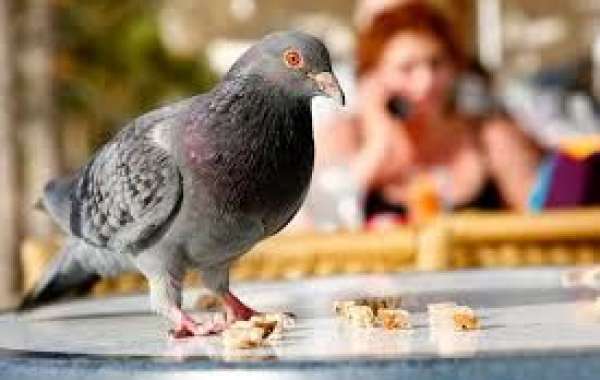Pigeons, often referred to as "rats with wings," have become a common sight in urban environments worldwide. While their cooing sounds and fluttering wings might seem charming to some, they can create significant issues for homeowners, businesses, and city planners. Managing these persistent birds requires a combination of understanding their behavior and implementing practical solutions.
Understanding the Behavior of Pigeons
To tackle the challenges associated with these birds, it’s essential to first understand their habits and behaviors. Pigeons are highly adaptable creatures. They thrive in cities because of the abundance of food, water, and nesting areas. Their ability to live in close proximity to humans has made them a permanent feature in urban areas.
Key Characteristics of Pigeons:
- Social Birds: Pigeons tend to live in flocks, which can range from a few birds to hundreds. This social nature makes them more noticeable and problematic when they gather in large numbers.
- Diet: They are opportunistic feeders and consume almost anything, from grains to leftover human food. This adaptability allows them to flourish in urban areas.
- Nesting Habits: Pigeons often nest in sheltered areas like building ledges, roofs, attics, and even air conditioning units. Their nests are simple structures made from twigs and debris.
- Breeding: Pigeons breed throughout the year, especially in mild climates. A single pair can produce multiple offspring annually, leading to rapid population growth if not managed effectively.
Problems Associated with Pigeons
While pigeons may seem harmless, their presence can lead to several issues:
Health Risks
Pigeons are carriers of various diseases that can spread to humans. Diseases such as histoplasmosis, cryptococcosis, and psittacosis are linked to pigeon droppings. These droppings can also encourage the growth of fungi and bacteria, creating additional health hazards.
Property Damage
Pigeon droppings are highly acidic, causing significant damage to buildings, vehicles, and outdoor furniture. Over time, the accumulation of droppings can corrode surfaces, leading to costly repairs.
Noise Pollution
The constant cooing sounds of pigeons can become a nuisance, particularly for those living or working in areas with large flocks. Additionally, the fluttering of their wings and movement can be disruptive.
Infestation of Parasites
Pigeons often carry parasites like mites, ticks, and fleas. These pests can infest buildings and pose a threat to humans and pets.
Effective Solutions to Manage Pigeons
Dealing with pigeons requires a balanced approach that considers both humane methods and long-term effectiveness. Here are some strategies to help manage their presence:
1. Deny Access to Food Sources
One of the simplest ways to manage pigeon populations is by removing their food supply. This involves:
- Properly sealing garbage bins to prevent access.
- Cleaning up food spills promptly, especially in public spaces.
- Educating the public about the consequences of feeding pigeons.
2. Modify Potential Nesting Sites
Preventing pigeons from nesting on your property is a key step in managing their presence. Consider:
- Installing bird spikes on ledges, roofs, and other flat surfaces where pigeons are likely to perch.
- Using bird netting to block access to potential nesting areas.
- Sealing gaps and crevices in buildings where pigeons might build nests.
3. Use Decoys and Deterrents
Visual and auditory deterrents can be effective in discouraging pigeons. Some popular options include:
- Reflective Objects: Hanging shiny materials like aluminum foil strips or reflective tape can scare pigeons away.
- Decoy Predators: Placing models of predatory birds, such as hawks or owls, can deter pigeons.
- Sound Devices: Ultrasonic devices or noise machines can make an area less appealing to pigeons.
4. Implement Professional Bird Control Solutions
In cases of severe infestation, professional help may be required. Pest control companies specialize in humane and effective solutions to manage pigeons. They can provide services such as:
- Installing advanced bird deterrent systems.
- Safe and humane removal of pigeons and their nests.
- Advising on long-term prevention measures.
5. Maintain Cleanliness
Regular cleaning of areas where pigeons congregate is crucial. Removing nests, droppings, and debris can discourage pigeons from returning. Always wear protective gear when cleaning to minimize exposure to harmful pathogens.
6. Plant Selection
If you have a garden or outdoor area, consider planting species that are less attractive to pigeons. Avoid plants that produce seeds or berries that pigeons might feed on.
Myths and Misconceptions About Pigeon Management
Managing pigeons often involves separating facts from myths. Here are some common misconceptions:
- Myth: Feeding pigeons helps control their population.
- Fact: Feeding pigeons only encourages them to breed more and increases their numbers.
- Myth: Killing pigeons is the best way to control them.
- Fact: Lethal methods are often ineffective because new pigeons will replace those removed. Non-lethal methods are more sustainable and humane.
- Myth: Pigeons only thrive in dirty areas.
- Fact: While pigeons are more likely to congregate in unclean spaces, they can adapt to almost any environment.
Benefits of Humane Pigeon Management
Adopting humane and sustainable methods for managing pigeons offers several advantages:
- Ethical Considerations: Humane methods respect the lives of animals while addressing the problem.
- Long-Term Results: Solutions like habitat modification and deterrents provide lasting results compared to temporary fixes.
- Environmental Impact: Non-lethal methods minimize harm to the ecosystem and other wildlife.
Final Thoughts
Pigeons are a natural part of urban ecosystems, but their presence can lead to challenges when left unchecked. By understanding their behavior and implementing effective management strategies, it is possible to coexist peacefully while reducing the problems they cause. Whether it’s through simple deterrents, professional services, or maintaining cleanliness, there are plenty of ways to address the issue of pigeons control without resorting to extreme measures. With the right approach, you can protect your property and health while respecting these resilient birds.




